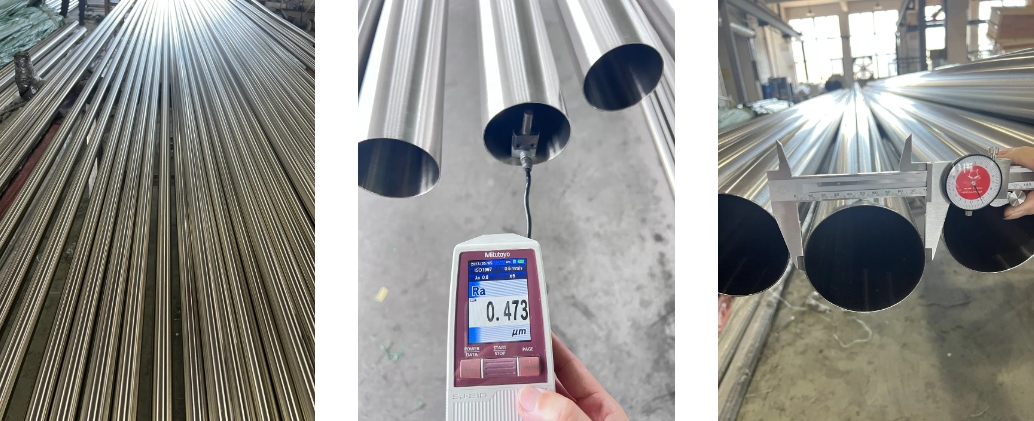1.4002 stainless steel annealed pickled tube is a ferritic-grade stainless steel tube that has undergone annealing and pickling treatment, resulting in a clean, oxide-free surface,After annealing at 750–800°C followed by air cooling, the tube's internal stress is relieved and its grain structure is refined. This process reduces the strength to 500–650 MPa and increases elongation to over 20%, significantly enhancing ductility and making it suitable for cold forming processes such as bending and flaring.
In addition, pickling with a nitric acid and hydrofluoric acid mixture effectively removes surface scale. This treatment achieves a surface roughness of Ra ≤ 1.6 μm and forms a uniform chromium-rich passive film, which extends salt spray corrosion resistance by over 30%, making it ideal for marine engineering, wastewater treatment, and other humid environments.
In addition, GNEE also provides 2B, BA, 4K, 8K and other surface treatment and groove services. Laser cutting and CNC processing are used, and V-shaped / UV-shaped grooves can be customized, with an angle accuracy of ±0.5° and a cut roughness of Ra≤3.2μm.

annealed 1.4002 stainless steel tube contains approximately 13% chromium and offers better corrosion resistance than low-carbon steel. After annealing and pickling, it remains stable in water, dilute nitric acid, and other mildly oxidizing media, making it a suitable alternative to 304 stainless steel in moderate corrosion applications such as automotive exhaust systems and architectural tubing.
In terms of cost, 1.4002 stainless steel round tubes are 15%–20% less expensive than 304. Since annealing is done outside the sensitization temperature range, there is no risk of intergranular corrosion. Combined with its ferritic structure and good weldability, 1.4002 is well-suited for urban water supply pipelines, structural curtain walls, and other large-scale construction projects.

| Element | Content (%) |
|---|---|
| C | ≤ 0.08 |
| Si | ≤ 1.00 |
| Mn | ≤ 1.00 |
| P | ≤ 0.040 |
| S | ≤ 0.015 |
| Cr | 10.5 – 12.5 |
| Al | 0.30 – 0.60 |
| Fe | Balance |
| Property | Typical Value |
|---|---|
| Tensile Strength (Rm) | 500 – 650 MPa |
| Yield Strength (Rp0.2) | ≥ 250 MPa |
| Elongation (A80) | ≥ 20% |
| Hardness (HBW) | ≤ 200 HBW |
| Density | ~7.70 g/cm³ |
| Modulus of Elasticity | ~200 GPa |
| Magnetic Properties | Magnetic (ferritic) |

Gnee strictly controls the sulfur content of 1.4002 stainless steel pipes to ≤ 0.005% and the phosphorus content to ≤ 0.035%, significantly enhancing the material's resistance to cracking. Each production batch undergoes PMI (Positive Material Identification) spectroanalysis, intergranular corrosion testing in accordance with ASTM A262-2015, and ultrasonic flaw detection. The chemical composition deviation is maintained within ±0.02%, and the flaw detection level meets Class I of JB/T 4730.3-2005 standards.

.jpg)

.jpg)



.jpg)





